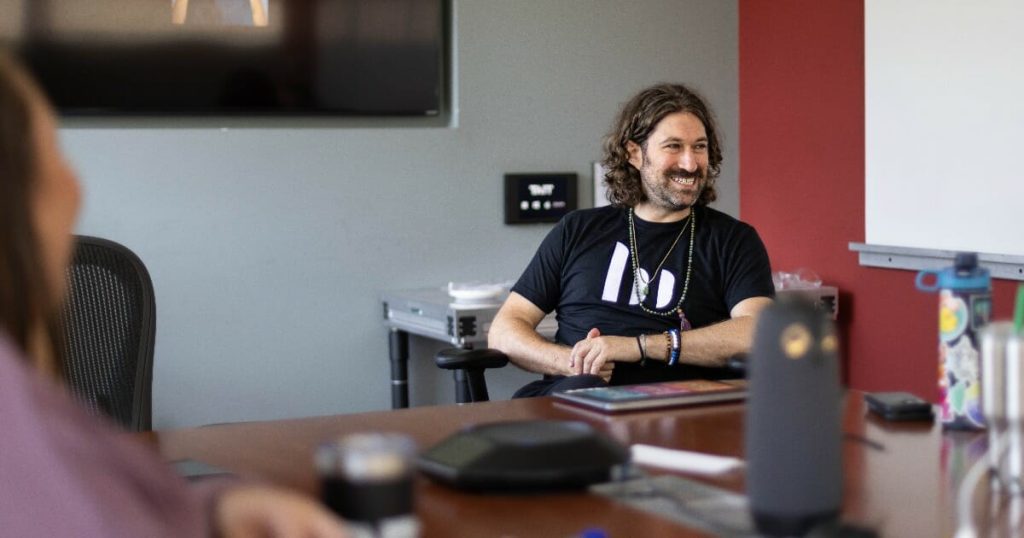
In 2022, Dr. Chayim Newman and Zack Borer, LMFT, revealed some sobering statistics published in the Journal of Psychiatric Research. The team found that from a 239-question survey given to more than 1,100 touring professionals and people working in the music industry, rates of depression, anxiety and risk of suicide were five to 10 times higher than the average population. The duo furthered their findings with a secondary study, shared in the peer-reviewed journal Psychology of Music, where they unveiled that mindfulness plays a protective and moderating role in combating the adverse effects.
“The scariest stat was that 26% percent of people we surveyed had either attempted to or thought about taking their own life in the previous year. That’s three out of every 12 people on the tour bus. And we were like, ‘That number needs to get lowered,’” Newman said over the phone from his Toronto office in early May referencing additional research that supports their undertaking.
Despite recent efforts and visibility, mental health and the music industry aren’t often thought of as a traditional pairing. Albeit, the majority of readers can conjure the names of artists they’ve lost and link it to a lack of resources to fend off feelings of hopelessness and self-doubt. That need for change was recognized by Newman and Borer, who established the eponymous mental health solutions provider Borer Newman which recently broadened through the launch of Amber Health on March 30.
Initially founded in 2020, Borer Newman was created to expand upon decades of clinical work with music industry professionals conducted by the founders. Amber Health will see the team continue to offer comprehensive, evidence-based mental health services for all sectors of the industry through clinician-designed, human-run, research-backed mental health support, workshops, mental health training, clinical care and consulting services.
“I came from festival production, artist relations and hospitality. Zack was a touring singer-songwriter in New York. Both of us really saw the industry over the years from the inside. And, in parallel to that experience, both of us really valued mental health and wanted to make an impact in the world in a meaningful way–alleviate suffering,” Newman said, outlining his and Borer’s experience prior to the launch of the company.
“When [Zack and I] were introduced and both realized that we shared this vision, we were like, ‘OK, we need to be able to create a kind of organism that’s going to be able to provide culturally-appropriate services. That matches the culture of this industry and takes into account the unique challenges, dynamics, and context of being someone that works in live entertainment.’ And at the same time, customize programming and clinical support to really match what those challenges are,” he offered.
“We’re still here voluntarily in this industry because it’s a special place,” Newman said. “The goal isn’t to run away from it, and the goal isn’t to make it a 9 a.m. to 5 p.m. Instead, it’s to find ways to strengthen ourselves internally and to make the small shift so that we can continue to engage in the work we love in the industry we love, but in a way that’s mentally and emotionally sustainable for people.”
He further emphasized his team’s position and intent to serve as supportive allies in the music industry, “We’re trying to encourage the entities in the industry–the tours, the festivals, the companies–to be willing to pay, what is a relatively moderate amount compared to the money that they earn, to be able to support the people that are helping gross the profit.”
Looking forward, Newman predicts, “In five years, this will be normal in this industry. For every tour. For every festival. In the way that catering is now. How will it get there in the next five years? I don’t think any of us know. But every single artist and crew member can have a role in that. Whether that role is speaking up about it or getting in touch and saying, ‘Hey, how can I get involved? How can I participate in some way? How can I bring this to my organization? Whether it’s them encouraging management to start thinking about this more or talking about it from the stage. It’s about opening that conversation. We need to be an industry whose ethos is not the show must go on at all human costs. Rather, we can make incredible human experiences and incredible music while caring for the human beings involved.”
To learn more, visit Amber Health’s official website.
If you or a loved one are experiencing thoughts of self-harm, help is available. The Suicide and Crisis Lifeline is available 24 hours by calling 988.
